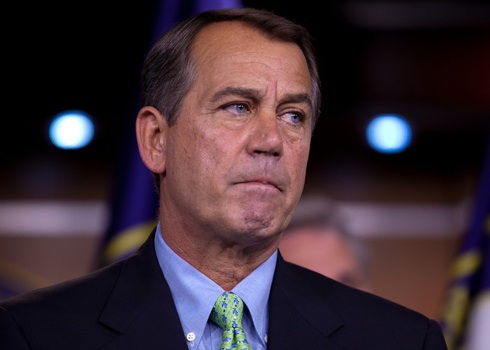The House of Representatives passed emergency legislation Tuesday to keep the government funded through mid-April and avoid a shutdown reminiscent of the one Newt Gingrich triggered back in 1995.
That was the broader result Speaker John Boehner wanted, and, indeed, House GOP leadership has insisted for months now that they don’t want a shutdown, period.
But Tuesday’s outcome was nonetheless a mixed one for Boehner. It illustrated a reality he’d hoped to escape — that a large chunk of his caucus won’t vote with him if he compromises. Indeed, the 54 Republicans who voted against the stop-gap legislation put him in an unenviable box: Either he kowtows to his right flank, and pushes initiatives that can’t pass in the Senate; or he abandons them, as Sen. Chuck Schumer (D-NY) has suggested, and passes consensus legislation. The latter option, however, would require significant concessions to win Democratic votes, and further delegitimize himself with the Tea Party base.
If he chooses option (b), he will need Democratic votes. And that would abruptly flip the dynamic on Capitol Hill, where Republicans have been riding high since they trounced Democrats in the November elections.
If he chooses option (a) — if he and his party don’t back off their pitched demand to fundamentally reshape the U.S. government — the consequences they’d hope to avoid — shutdowns and worse — will become all but inevitable.
Two weeks ago, the House passed a similar stop-gap spending resolution with almost 340 votes. Only a handful of Republicans defected. Indeed, if every Democrat had voted against that funding measure, Boehner could have pushed it through on the strength of GOP votes alone. Tuesday’s vote was much different. Although the three-week stopgap passed with 270 votes — dozens more than needed to pass — Boehner lost scores of his own members, and needed the help of many, many Democrats to get it done.
In a statement to reporters shortly after the vote was gaveled closed, Schumer crowed.
“Speaker Boehner wouldn’t have been able to pass this short-term measure without Democratic votes, and he won’t be able to pass a long-term one without Democratic votes either,” he said. “It’s time for him to abandon the Tea Party, and forge a bipartisan compromise.”
Huddling with reporters after the vote, House Democratic Whip Steny Hoyer broke it down. “There are a large number on their side which preclude a majority of Republicans from saying that they’re prepared to compromise,” he said.
If the 54 Republicans who rebelled Tuesday are drawing a firm line in the sand, which Hoyer said they appeared to be, then GOP leaders need to accept that their hand is weakened. “I am hopeful that based upon this vote Mr. Boehner and Mr. Cantor will sit down with us and we’ll try to come to a figure.”
Republicans might argue that this is a hiccup — that their members were rebelling against the short-term nature of the spending resolution, not the substance, which included billions in spending cuts. But this isn’t the first time House conservatives have fired a shot across the leadership’s bow. At the beginning of the appropriations process, House Republican leaders put forward a plan that amounted to about $30 billion in cuts from current spending, to fund the government through September. The right rejected that plan, and forced Boehner et al to cut about twice as much.
Unless rank and file Republicans decide to abandon that position and fall into line behind the same leadership team they’ve bucked for weeks, Boehner has to pick from a list of bad options. And even if Boehner can right course before the new April deadline, this is the small stuff. Looming are much trickier fights over the debt limit and the budget for fiscal year 2012.
“I’m going to talk to both of them [Boehner and Cantor] either tonight or tomorrow,” Hoyer said. “This would not have passed if the Democrats hadn’t helped.”






